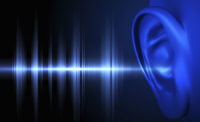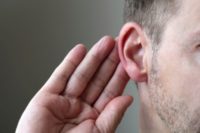Good hearing health starts with awareness

Good hearing health
NIHL is the only type of hearing loss that is completely preventable, NIDCD says. If you understand the hazards of noise and how to practice good hearing health, you can protect your hearing for life. Here’s how:
- Know which noises can cause damage (those at or above 85 decibels).
- Wear earplugs or other protective devices when involved in a loud activity.
- If you can’t reduce the noise or protect yourself from it, move away from it.
- Be alert to hazardous noises in the environment.
- Protect the ears of children who are too young to protect their own.
- Make family, friends and colleagues aware of the hazards of noise.
- Have your hearing tested if you think you might have hearing loss.
Recognize the warning signs
The Better Hearing Institute (BHI) says to suspect hearing loss if you experience any of these signs:
Socially:
- require frequent repetition.
- have difficulty following conversations involving more than two people.
- think other people sound muffled or like they’re mumbling.
- have difficulty hearing in noisy situations, like conferences, restaurants, malls or crowded meeting rooms.
- have trouble hearing children and women.
- have your TV or radio turned up to a high volume.
- answer or respond inappropriately in conversations.
- have ringing in your ears.
- read lips or more intently watch people’s faces when they speak with you.
Emotionally:
- feel stressed out from straining to hear what others are saying.
- feel annoyed at other people because you can’t hear or understand them.
- feel embarrassed to meet new people or from misunderstanding what others are saying.
- feel nervous about trying to hear and understand.
- withdraw from social situations you once enjoyed because of difficulty hearing.
Medically:
- have a family history of hearing loss.
- take medications that can harm the hearing system (ototoxic drugs).
- have diabetes, heart, circulation or thyroid problems.
- have been exposed to very loud sounds over a long period or single exposure to explosive noise.
Overall impact
According to BHI, studies have linked untreated hearing loss to:
- irritability, negativism and anger
- fatigue, tension, stress and depression
- avoidance or withdrawal from social situations
- social rejection and loneliness
- reduced alertness and increased risk to personal safety
- impaired memory and ability to learn new tasks
- reduced job performance and earning power
- diminished psychological and overall health
If you think you may suffer from hearing loss, seek the help of a hearing healthcare professional. And if you recognize any signs of hearing loss in a co-worker, friend or family member, encourage them to do the same.
Looking for a reprint of this article?
From high-res PDFs to custom plaques, order your copy today!







